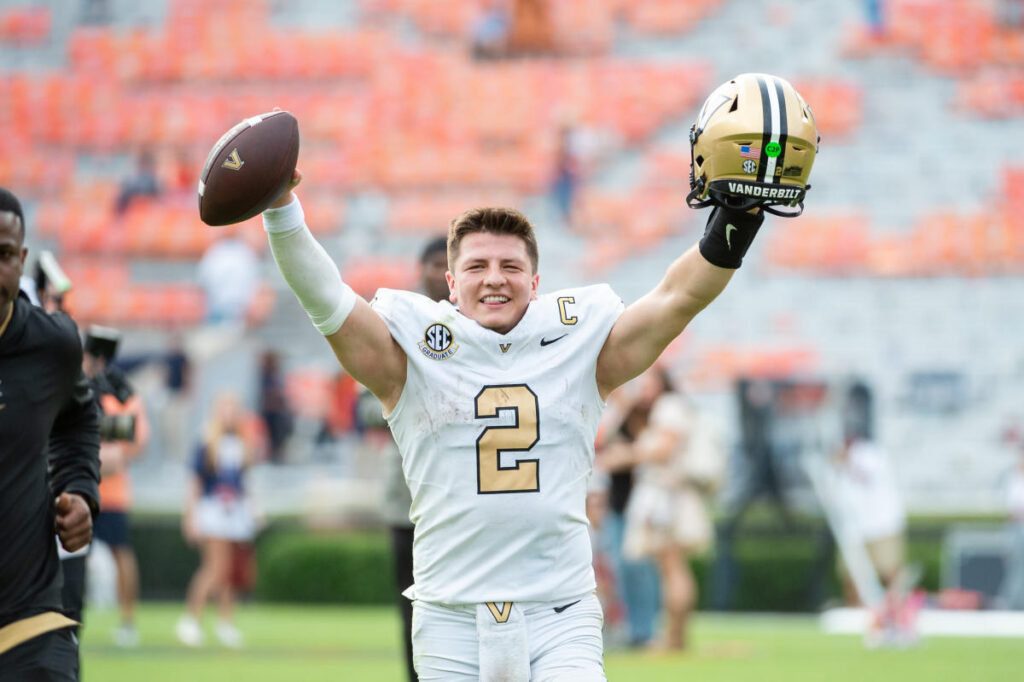Som junior college athletes will see their careers extended, at least for now.
The NCAA Division I Board of Directors, composed of university presidents, agreed to a waiver for junior college players that grants them an additional year of eligibility if they are in a similar situation as Vanderbilt quarterback Diego Pavia.
Pavia is suing the NCAA over its eligibility standards, arguing that his junior college playing seasons should not count as part of his four seasons of NCAA eligibility. The NCAA DI Board’s decision came five days after a Tennessee federal court granted Pavia an injunction that prohibits the association from counting his junior college seasons, granting him an additional year of eligibility.
The court ruling only applied to Pavia. However, the NCAA, in an effort to keep fairness among its competitive schools, granted additional eligibility to all similarly positioned athletes, according to a memo sent to schools.
Athletes like Pavia who were expected to use their final year of eligibility this academic year are now eligible next season. Pavia played two seasons of junior college and three seasons of Division I football (one of those being the COVID redshirt season). Because of the court ruling, he will receive a sixth season of NCAA eligibility.
“The NCAA Division I Board of Directors granted a waiver to permit student-athletes who attended and competed at a non-NCAA school for one or more years to remain eligible and compete in 2025-26,” the NCAA memo reads, “if those student-athletes would have otherwise used their final season of competition during the 2024-25 academic year, and meet all other eligibility requirements (e.g., progress toward degree, five-year period of eligibility).”
The NCAA also plans to file an appeal to the court’s ruling in the Pavia lawsuit, it announced Monday.
In perhaps more important news, the NCAA could be barreling toward a more significant change to its eligibility rules, something the association suggested in its memo to schools Monday. The NCAA’s memo reminded schools that the Division I Council is exploring a “comprehensive” review of eligibility rules to create a framework that will be “sustainable and can withstand scrutiny,” the memo said.
There is movement from college leaders to adjust the eligibility rule in a way that grants athletes five playing seasons in a five-year time span. Current NCAA rules permit athletes four playing seasons over a five-year stretch, often referred to as the association’s “five-year eligibility clock.”
For now, only certain sports grant athletes the ability to play in multiple contests and still retain a year of eligibility. For instance, football players can recoup a season of eligibility with a redshirt if they play in fewer than four games during a season.
The NCAA board’s ruling Monday opens the door for hundreds, if not thousands, of former junior college athletes to have their careers extended, if they so choose. As the NCAA suggested in its statement on the injunction last week, the consequences of such will be felt by high school players whose projected roster spots are no longer becoming free.
The decision comes amid an unstable and somewhat chaotic time, too. Schools are scrambling to adhere to new rules imposed as part of the NCAA’s landmark settlement of the House antitrust case, including stricter limitations on the size of rosters. More than 4,000 roster spots are expected to be cut among the power leagues alone.
“Altering the enforcement of rules overwhelmingly supported by NCAA member schools makes a shifting environment even more unsettled,” the association said in the statement last week.
The court’s ruling last week is the third major court decision in the last year to bar the association from enforcing a rule. A West Virginia court made it possible for athletes who are transferring a second time or more to play immediately. A ruling in a Tennessee federal court made mostly moot the NCAA’s interim NIL policy, permitting boosters and booster-led collectives to negotiate with athletes before they enroll.
At the heart of Pavia’s argument is the fact that he and other athletes are now eligible to receive compensation from boosters and, soon, from schools through the House settlement’s revenue-sharing provision.
He stands to earn at least $1 million next year in college, he says in the filing. Starting in July, schools are permitted to directly share revenue with athletes. It paves the way for millions of dollars — as much as $20.5 million annually per school — to be shared with athletes in a giant step as major college sports moves from an amateurism model to a professionalized concept.
It’s a good reason for athletes — especially players unlikely to be drafted — to remain in college as long as they can.
#NCAA #agrees #waiver #JUCO #players #Diego #Pavia #lawsuit #injunction


